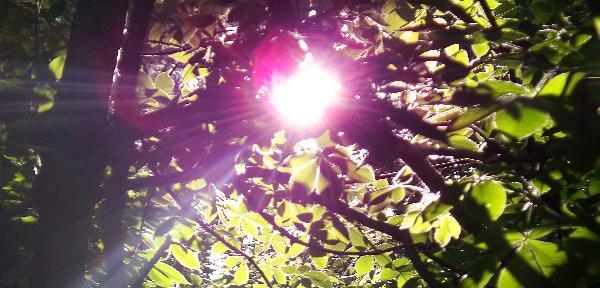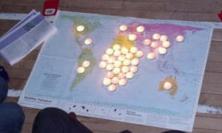
It is reported that Pope Francis is preparing a text on the environment, and Donal Dorr expects that the resulting document will develop the links that Francis has already and repeatedly made between ‘concern for the exploited earth and concern for marginalised and exploited people’. How does Pope Francis’ thinking about the environment compare with that of Popes John Paul II and Benedict XVI?
In the first part of this article I shall give a brief sketch of key elements in official Vatican teaching on ecology prior to the election of Pope Francis. In the second part, I shall give some account of the approach of Pope Francis and speculate about what we may hope for in the encyclical or document on ecology which, we are now told officially, he is writing.
Catholic teaching on ecology prior to Pope Francis[1]
In 1971 the document Justice in the World, issued by the Synod of Bishops, represented a major step in the development of Catholic teaching on the environment; Barbara Ward-Jackson was a consultant before and during the synod and undoubtedly had a considerable influence on its outcome. This document emphasised the close link between ecology and justice; one could say that it linked an ‘option for the poor’ with an ‘option for the earth’ – though it did not use these terms. It insisted that it is not possible for all parts of the world to have the kind of ‘development’ which characterised the wealthy countries.[2] It therefore called on those who are rich ‘to accept a less material way of life, with less waste, in order to avoid the destruction of the heritage which they are obliged by absolute justice to share with all other members of the human race.’[3]
Pope John Paul II
In his first encyclical, Redemptor hominis (1979), Pope John Paul II warned about ‘the threat of pollution of the natural environment’.[4] In his 1987 encyclical, Solicitudo rei socialis, he referred to ‘the limits of available resources’ and used the term ‘the integrity and cycles of nature’.[5] In describing the relationship between humans and the rest of nature, John Paul sometimes used language which we would now avoid – writing of ‘the exploitation of the earth’ in a favourable sense and of the human person as ‘master’ of the earth.[6] However, on the many occasions when he met indigenous peoples in various parts of the world, he invariably stressed the vital relationship that exists between indigenous peoples and their land.
John Paul’s 1990 ‘Message for the World Day of Peace’ provided a quite comprehensive teaching on ecology and went a long way towards enabling the Catholic Church to catch up with the approach which had been developed in the World Council of Churches. It pointed out that:
The gradual depletion of the ozone layer and the related ‘greenhouse effect’ has now reached crisis proportions as a consequence of industrial growth, massive urban concentrations and vastly increased energy needs. Industrial waste, the burning of fossil fuels, unrestricted deforestation, the use of certain types of herbicides, coolants and propellants: all of these are known to harm the atmosphere and environment.[7]
When it went on to consider how ecological problems can be overcome, this message insisted on the need for ‘a more internationally coordinated approach to the management of the earth’s goods’[8]; and it pointed out that the ecological problem cannot be solved unless modern society ‘takes a serious look at its life style.’ It insisted that: ‘simplicity, moderation and discipline, as well as a spirit of sacrifice, must become a part of everyday life’.[9] It also insisted on the integrity of creation. Nevertheless, in this document and later ones, John Paul had an anthropocentric conception of the relationship between humans and the rest of nature – seeing the value of the rest of the natural world almost exclusively in terms of its value for humans.
In his 1991 social encyclical, Centesimus annus, John Paul said:
The earth ... is God’s first gift ... But the earth does not yield its fruits without a particular human response to God’s gift, that is to say, without work. It is through work that man ... succeeds in dominating the earth.[10]
I have put the word ‘gift’ in italics because it prefigures the strong emphasis by Pope Benedict XVI seventeen years later on the idea of the earth as a gift. I have also put the word ‘dominating’ in italics because it suggests that John Paul held on to the older understanding of God’s command in the book of Genesis as a justification for dominating the rest of the natural world. In Centesimus annus, John Paul made a contrast between natural ecology and what he called ‘human ecology’, with the suggestion that the latter is more important. I shall return to this issue in the second part of this article. Nevertheless, John Paul made a very valuable contribution to Catholic Social Teaching by putting a strong emphasis on ecological issues. One of the most significant aspects of his teaching came when, in a General Audience in 2001, he spoke of the need for humans to have an ‘ecological conversion.’Pope Benedict XVI
Pope Benedict XVI was deeply committed to raising awareness about the urgency of finding solutions to ecological problems and to promoting an ecologically respectful lifestyle. But, perhaps even more strongly than John Paul II, he contrasted ‘the human environment’ with the natural environment. He insisted that there is an inseparable link between the two but held that the former is ‘more serious’ and should be given priority.In his encyclical Caritas in Veritate (2009), Pope Benedict maintained that the environment is ‘God’s gift to everyone’ and that we must respect the ‘inbuilt order’ or ‘grammar’ which God has given to nature, rather than treating it as raw material which we can use in any way we wish. But he warned of the danger of seeing nature as more important than humans and seemed to be unduly concerned about the dangers of ‘neo-paganism or a new pantheism’.[11] He gave a quite detailed account of the various ecological issues we face and called for ‘a responsible stewardship over nature, in order to protect it, to enjoy its fruits and to cultivate it in new ways.’[12] He went on to point out the need for ‘an effective shift in mentality which can lead to the adoption of new life-styles’.[13]
Benedict made an important contribution to Catholic Social Teaching by insisting on ‘inter-generational justice’[14], ‘intergenerational solidarity,’ and ‘a solidarity which embraces time and space’.[15]
On the issue of the use of biotechnology for genetic modification (GM) the Vatican has given mixed messages, sometimes warning of its dangers and sometimes seeming to be quite in favour. During the years when Cardinal Marino was head of the Pontifical Council for Justice and Peace, that Council seemed strongly in favour of GM. The Compendium of the Social Doctrine of the Church which it issued in 2004 gives a quite favourable account of biotechnology, though it does, of course, say that it should be used responsibly.[16] More recently, the attitude of the Pontifical Council seems rather more cautious and ambivalent.
I would suggest that neither Pope John Paul II nor Pope Benedict XVI sufficiently locate the economic issues we face in the context of ecology. Furthermore, both popes could be said to have an anthropocentric approach to ecological issues. So there is a need for a theological conversion alongside the ‘ecological conversion’ which they have rightly called for. The ‘theological conversion’ which is needed is a paradigm shift which involves situating us humans, with all our achievements, our problems and our responsibilities, within the wider context of nature.
Pope Francis on ecology
Pope Francis has a particular concern for the environment. On 16 March 2013, just three days after he had been elected, he told journalists that he had chosen the name of Francis of Assisi because ‘Francis was a man of poverty, who loved and protected creation.’ Three days later, during the Mass to mark his inauguration as Bishop of Rome, he linked protection of people with protection of the environment, pointing out that being a protector ‘means protecting all creation, the beauty of the created world;’ and he added: ‘Everything has been entrusted to our protection, and all of us are responsible for it.’ Francis’ linking of concern for the exploited earth with concern for marginalised and exploited people has been a consistent theme of his papacy thus far.
On 5 June 2013, UN World Environment Day, Francis devoted his General Audience message to this topic. Condemning ‘consumerism’ and a ‘culture of waste,’ he called for ‘a spirit of solidarity grounded in our common responsibility for the earth and for all our brothers and sisters in the human family.’ On Easter Sunday 2013, he said, ‘let us be … channels through which God can water the earth, protect all creation and make justice and peace flourish.’
During his visit to Brazil in July 2013, Pope Francis met with and encouraged indigenous people from the Amazon region who have been resisting the encroachment on the forest by ranchers, farmers and agribusiness enterprises. In his address to the bishops during his time in Brazil he called for ‘respect and protection of the entire creation which God has entrusted to humanity’ and said that it should not be ‘indiscriminately exploited but rather made into a garden.’ Furthermore, he drew attention to the important 2007 document of the Latin American and Caribbean bishops (CELAM), of which he was a major architect and which underscored the dangers facing the Amazon environment and the indigenous people living there.[17]
It may seem surprising that Francis devoted only a small section of Evangelii Gaudium to the topic of ecology. This may be partly because that document was a response to what had emerged in the 2012 Synod of Bishops on the New Evangelisation, where the environment had not been a major issue. It may also be that the pope was holding back on this topic because, as he said to visitors from Argentina in early November 2013, he intends to treat it much more comprehensively in an encyclical on the topic on which he is working. This intention of the pope was re-affirmed when, on 24 January 2014, the Vatican spokesperson, Fr. Lombardi, said that the pope is working on a text ‘which could become an encyclical’.[18]
In Evangelii Gaudium, the pope’s first reference to the topic of ecology comes when he says, ‘whatever is fragile, like the environment, is defenceless before the interests of a deified market’.[19] Later in the document he says:
There are other weak and defenceless beings who are frequently at the mercy of economic interests or indiscriminate exploitation. I am speaking of creation as a whole. We human beings are not only the beneficiaries but also the stewards of other creatures. Thanks to our bodies, God has joined us so closely to the world around us that we can feel the desertification of the soil almost as a physical ailment, and the extinction of a species as a painful disfigurement. Let us not leave in our wake a swath of destruction and death which will affect our own lives and those of future generations.[20]
He then goes on to say: ‘Small yet strong in the love of God, like Saint Francis of Assisi, all of us, as Christians, are called to watch over and protect the fragile world in which we live, and all its peoples’.[21]
Francis took up the topic, again rather briefly, in his 2014 ‘Message for the World Day of Peace’. He referred to ‘the devastation of natural resources and ongoing pollution’.[22] He then went on to repeat the emphasis of Benedict XVI, in his encyclical Caritas in Veritate, on nature as gift and his use of the phrase ‘the grammar of nature’:
The human family has received from the Creator a common gift: nature. The Christian view of creation includes a positive judgement about the legitimacy of interventions on nature if these are meant to be beneficial and are performed responsibly, that is to say, by acknowledging the ‘grammar’ inscribed in nature and by wisely using resources for the benefit of all, with respect for the beauty, finality and usefulness of every living being and its place in the ecosystem. Nature, in a word, is at our disposition and we are called to exercise a responsible stewardship over it.[23]
Francis pointed out that we are failing in the task of stewardship: ‘so often we are driven by greed and by the arrogance of dominion, possession, manipulation and exploitation; we do not preserve nature; nor do we respect it or consider it a gracious gift which we must care for and set at the service of our brothers and sisters, including future generations’.[24]The controversial term ‘human ecology’
In his statement of 24 January 2014, Fr. Lombardi underlined the point that the new document on which Pope Francis is working ‘would specifically emphasise ‘human ecology”’.[25] This raises the question of whether Francis will continue along the anthropocentric line adopted by John Paul and Benedict, making a sharp distinction between ‘natural ecology’ and ‘human ecology,’ and playing down the former in favour of the latter. I am hopeful that this will not be the case.
Ecologists and ecological theologians are generally reluctant to make a contrast between ‘human ecology’ and ‘natural ecology.’ The term ‘human ecology’ has been used in the social sciences since the early 1920s. It refers to the relationship between humans and their natural, social and cultural environments. So it seems inappropriate to contrast it with ‘natural ecology.’ It would appear that Pope John Paul and Pope Benedict were using the term ‘human ecology’ in a more restricted sense which would not give sufficient weight to the fact that humans are one part of the ecology of nature.
There are indications that the thinking of Pope Francis is different. Rather than contrasting ‘human ecology’ with ‘natural ecology,’ he has on several occasions made a very close link between exploited people and the exploited environment, describing both of them as ‘fragile’ or ‘defenceless’.[26] My hope is that, in the encyclical or document on which he is working, he may not use the term ‘human ecology;’ however, if he chooses to use it, I feel confident that he will give it the wider meaning that it has in the social sciences. It would mean the pope would be situating us humans and our relationships within the context of our diverse social and cultural environments and, more especially, of our situation as an integral part of the whole evolving natural order.[27]
Conclusion
Paul Vallely, whose book Pope Francis: Untying the Knots is the most comprehensive and insightful book in English on Pope Francis, wrote an interesting article in The Irish Times of 4 February 2014. He outlined the stance of Pope Francis on three distinct issues where there is a sharp difference of view within the Catholic Church. On the left-right division about whether or to what extent one accepts capitalism, Vallely sees Francis as being quite far to the left. On the issue of centralisation versus decentralisation and subsidiarity he sees Francis as being quite radical. And on the progressive-conservative division on doctrinal questions, he notes the nuanced pastoral approach of Francis. Vallely also says that on the environmental issue, Francis ‘looks set to move the church on to a more radical political agenda.’ Although Vallely does not elaborate on this point, all the indications are that this judgment is correct; and the various quotations and references given above provide solid support for this view.
Donal Dorr SMA is a theologian and a member of St Patrick’s Missionary Society. He is the author of numerous books and articles on spirituality social justice and Catholic Social Teaching.
[1] For a much fuller treatment of the material in the first part this article see my book Option for the Poor and for the Earth (Orbis Books: 2012), pp. 412-439; here I merely pick out some key points.
[2] Synod of Bishops, Justice in the World (1971), §11.
[3] Justice in the World, §70.
[4] Pope John Paul II, Redemptor hominis (1979), §11.
[5] Pope John Paul II, Solicitudo rei socialis (1987), §26.
[6] Redemptor hominis, §15.
[7] John Paul II, ‘Message for the World Day of Peace’ (1990), §6.
[8] Ibid., §9; all emphases original unless otherwise stated.
[9] Ibid., §13.
[10] John Paul II, Centesimus annus (1991), §31 (emphasis added).
[11] Pope Benedict XVI, Caritas in Veritate (2009), §48.
[12] Ibid., §50.
[13] Ibid., §51.
[14] Ibid., §48.
[15] Pope Benedict XVI, ‘Message for World Day of Peace’ (2010), §8.
[16] See my Option book pp. 427-9 for detail.
[17] http://life.nationalpost.com/2013/07/27/pope-francis-calls-for-respect-and-protection-of-environment-end-to-exploitation-of-amazon-rainforest/
[18] The Tablet, 1 February 2014, p. 27.
[19] Pope Francis, Evangelii Gaudium (2013), §56.
[20] Ibid., §215.
[21] Ibid., §216.
[22] Pope Francis, ‘Message for the World Day of Peace’ (2014), §8.
[23] Ibid., §9.
[24] Ibid.
[25] The Tablet, 1 February 2014, p. 27.
[26] Evangelii Gaudium §56 and §215.
[27] Evangelii Gaudium.





